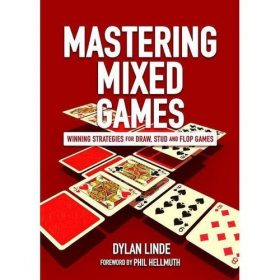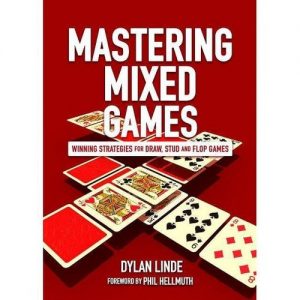The Flushdraw Review: Dylan Linde’s ‘Mastering Mixed Games’
Flushdraw continues its occasional book-review series with a look at one of this year’s more interesting strategy releases, Dylan Linde’s Mastering Mixed Games: Winning Strategies for Draw, Stud and Flop Games. It’s one of several 2019 releases issued by D&B Publishing (dandbpoker.com), which itself has moved to the likely premier spot as a publisher of poker books.
First, it’s great to see something on the market other than yet another hold’em or Omaha examination, though as Mastering Mixed Games casts a reasonably wide net, variants of those games appear as well. What you’ll find here are strategic examinations of all the games you’ll encounter in something such as an eight-game mix tourney, plus a few extra variants that combined account for the mixed-game variants players are likely to encounter in cash games.
Linde, for those unfamiliar with him, is a mixed-games pro who plays these formats whenever and wherever he can find them, though he’s also a feared pro at any hold’em or PLO table as well. Linde plays an aggressive game based on very sound poker fundamentals, and since Mastering Mixed Games is largely a principles-and-fundamentals book, he’s well suited for the task.
Don’t be misled into thinking this is a beginner’s book, however. It’s written for an intermediate-to-expert audience, and if you’re literally just learning some of these games, much of what Linde offers here might be tough to absorb. The rewards are here, though.
Mastering Mixed Games is broken down into four basic sections as follows:
Section 1: Flop Games
- Chapter 1: Limit Hold’em
- Chapter 2: Limit Omaha 8-or-Better
- Chapter 3: Pot-Limit
Section 2: Stud Games
- Chapter 4: Stud High
- Chapter 5: Razz
- Chapter 6: Stud 8-or-Better
Section 3: Triple Draw Games
- Chapter 7: Deuce to Seven Triple Draw
- Chapter 8: Badugi
- Chapter 9: Badeucey and Badacey
Section 1: Flop Games
- Chapter 10: Deuce to Seven No-Limit Hold’em Single Draw (40BB Cap)
Starting off with plain ol’ boring limit hold’em, you might wonder? First, it’s the logical entry point for mixed-games thought, but second and far more importantly, this isn’t your daddy’s fixed-limit hold’em that’s being discussed. Gone are the starting-hand charts, replaced with a focus on position and aggression.
Mastering Mixed Games is all about aggression, largely above anything else, yet there are situational limits. Linde makes that clear in the second chapter, Limit Omaha 8-or-Better, where he explains that the game’s format makes pre-flop aggression an often fruitless tactic, due to the odds and variance involved. Instead, as he demonstrates, it’s far more advantageous to see flops with hands with positive expectations, then choose a strategy — perhaps to thin the field or to build a larger pot. It’s this sort of situational awareness that defines Linde’s approach to these games.
Another Linde theme running throughout the book is that of situational equity — understanding how one’s hand is likely to stack up against a range of opponent’s typical holdings. The emphasis, though, is on the situational part: With each street dealt, the odds that your hand is the best can change, often dramatically. Evaluating this process throughout a given hand is a good part of the approach Linde strives to teach. Each chapter even comes with a couple of brief quizzes, in the format of what is the optimal decision in a typical hand as it plays out. (If you’re not a true expert, some of Linde’s well-explained answers are likely to surprise you.)
This is a strong book, for the territory it covers. Is it a perfect book? Nope. If it has a flaw, it’s that it veers to frequently into the esoteric, and often, the gold here is buried behind less-than-captivating ledes. For instance. here’s a gem about playing in limit Omaha 8-or-better games that can often be loose: “Your profit will accrue from drawing to the nuts and allowing the other players to make the mistake of guessing if their draws have any equity in multi-way situations.” To get to this, though, one has to venture into a section given the eyeball-glazing description of “Post-flop Concept Two: Hand Values in Various Field Sizes and Cleaning Up Outs”. Egad! It’s a dissertation!
Ah, well, this one is still well worth the investment for a mixed-games player looking to up his game. Let’s give Linde’s effort here a solid four stars out of five, and it’s maybe even a touch stronger than that.



















COMMENTS